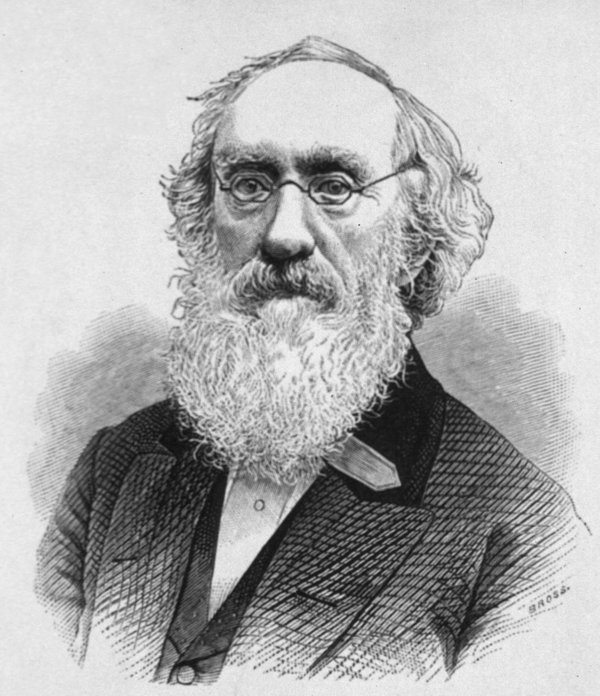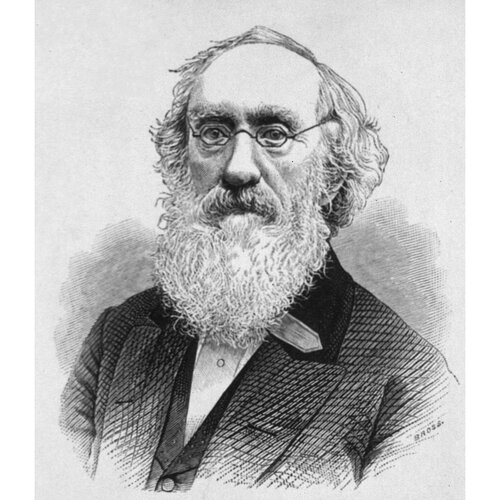
Source: Courtesy of Wikimedia Commons
O’CALLAGHAN, EDMUND BAILEY (Baillie occurs sometimes), doctor, mha, journalist, and archivist; b. probably on 27 Feb. 1797 at Mallow in Ireland; d. 29 May 1880 in New York, N.Y.
Edmund Bailey O’Callaghan studied medicine first at Dublin in 1820, then in Paris. He arrived at Quebec in 1823, continued his medical studies there, and received authorization to practise in 1827. It was particularly because of his political involvement that he attracted attention; indeed, even in his first months at Quebec he began to work with the earnest and express purpose of making the political and religious life of the capital aware of the Irish fact. As a member and then secretary (1829–33) of the Society of the Friends of Ireland, a founding member (1830) of the Quebec Mechanics’ Institute, and president (1833) of the Quebec Emigrant Society, he seems to have devoted all his efforts to reconciling the Irish and the party of Louis-Joseph Papineau. He also promoted a school for Anglophone Catholics in the Près-de-Ville district; and, in his capacity as secretary for the committee of stewards of St Patrick’s Church, he was a principal founder of the Irish parish of Quebec.
Even though he had thus ensured for himself “a reputable existence” at Quebec, O’Callaghan, according to Le Canadien of 17 May 1833, decided to move to Montreal and accept the editorship of the Vindicator and Canadian Advertiser, owned by the famous Patriote bookseller Édouard-Raymond Fabre*. He was its editor for four and a half years. At the same time he continued to take an active part in Irish affairs: he joined the Montreal section of the Society of the Friends of Ireland, and was elected a member of the management committee of the normal school at Montreal. In 1834 he allowed himself to be persuaded by Papineau to stand in the county of Yamaska, where he was elected thanks to his leader’s support. In the house, he made himself one of the most spirited and fiery defenders of the Patriote party. He was in fact Papineau’s right-hand man. After the death of Louis Bourdages* on 20 Jan. 1835, O’Callaghan replaced him as chairman of the grievances committee. Then, at the opening of the 1836 session, when the members of the assembly who supported Papineau appeared at the bar of the council dressed in homespun after the Canadien manner, O’Callaghan was among those whose originality of costume drew the most attention. For several years speeches and writings had been making him just as conspicuous. He was an impassioned speaker, even a demagogue; he could give a fierce retort and wield a bitter and satirical pen. Lord Gosford [Acheson*] and especially Lord Aylmer [Whitworth-Aylmer* ] had suffered through his Irish transports. Hence it was not surprising that a crowd of Doric Club members sacked the offices of the Vindicator on the night of 6 Nov. 1837.
O’Callaghan had incited his fellow-citizens to revolt. “Agitate! Agitate!! Agitate!!!” he had written in the autumn of 1837, “Destroy the Revenue; denounce the oppressors. Everything is lawful when the fundamental liberties are in danger.” But when the riot broke out at Montreal (and against him!), he left immediately with Papineau for the Richelieu valley, and once a price was put on his head he made his way to the United States. Subsequently, even if he maintained a fairly regular correspondence with Canadian leaders such as Louis-Joseph Papineau, William Lyon Mackenzie*, Édouard-Raymond Fabre, and Louis Perrault, he never set foot again in British territory.
In April 1839, after a stay in New York, O’Callaghan took up residence at Albany. He practised medicine there until 1846, and was a member of the Albany County Medical Society. During this period he became an enthusiastic student of history. Between 1842 and 1844 he published several articles in the Northern Light, a newspaper that upheld the interests of the working class. His house became the meeting-place of the scholars and cultured men of the region. In 1848 he gave up medicine to accept the post of archivist of the state of New York. During the 22 years that followed, he devoted himself with indefatigable energy to the publication of documents relating to the colonial period. His principal works are: History of New Netherlands . . . (1846–48); Jesuit relations of discoveries and other occurrences in Canada and the northern and western states of the Union, 1632–1672 (1847); A list of editions of the Holy Scriptures, and parts thereof, printed in America previous to 1860 (1861); and The register of New Netherland; 1626 to 1674 (1865). He edited the first 11 volumes of the Documents relative to the colonial history of the State of New-York . . . (1853–61), which contain valuable material on the history of the state and which are important in Canadian history as one of the earliest published sources of French documents (translated into English) relating to the frontier conflict of New France and New York and their rivalry over the Ohio country and the pays d’en haut. In addition to other works he edited The documentary history of the State of New-York (1850–51), and the Calendar of historical manuscripts in the office of the secretary of state, Albany, N. Y. (1865–66). He also wrote an introduction, outlining the history of New York from 1691 to 1775, for the Journal of the Legislative Council of the colony of New York . . . (1861).
In 1870, Mayor Abraham Oakey Hall of New York City commissioned him to prepare for publication the proceedings of the municipal council. O’Callaghan therefore moved to New York. Before his death he had succeeded in preparing the text of 15 volumes. Unfortunately, because of budgetary restrictions, these were never published. They are now the property of the New York Historical Society.
O’Callaghan was a serious, thin, pale man, totally lacking in elegance, and with nothing physically attractive about him. The electors of Yamaska had nicknamed him Doctor “qu’a la gale.” But according to Joseph-Guillaume Barthe* he was bilingual, a man of great scholarship, who spoke easily and with a real flow of words, and who had a keen eye. His library was particularly well stocked, and he was a highly cultured man. In 1830, at Sherbrooke, he had married Charlotte Augustina Crampe, born in Ireland around 1800. She died on 17 July 1835 as a result of a disease of the lungs. She had given birth to a boy, who survived only a few days. On 9 May 1841, in the United States, O’Callaghan married again; his second wife was Ellen Hawe, who bore him a son; he also died at a very young age.
Edmund Bailey O’Callaghan’s main works are: A History of New Netherlands; or, New York under the Dutch (2v., New York, 1846–48); Jesuit relations of discoveries and other occurrences in Canada and the northern and western states of the Union, 1632–1672 (New York, 1847); Laws and ordinances of New Netherlands, 1638–1674; compiled and translated from the original Dutch records in the office of the secretary of state (Albany, N.Y., 1868); A list of editions of the Holy Scriptures, and parts thereof, printed in America previous to 1860 (Albany, N.Y., 1861); The register of New Netherland; 1626 to 1674 (Albany, N.Y., 1865).
The following are some of the works he edited: Calendar of historical manuscripts in the office of the secretary of state, Albany, N. Y. (2v., Albany, N.Y., 1865–66); The documentary history of the State of New-York (4v., Albany, N.Y., 1850–51); Documents relative to the colonial history of the State of New-York; procured in Holland, England and France, by John Romeyn Brodhead . . . ed. with Berthold Fernow (15v., Albany, N.Y., 1853–87), I–XI; Journal of the Legislative Council of the colony of New York . . . 1691; . . . 1775 (2v., Albany, N.Y., 1861).
PAC, MG 24, B50 (O’Callaghan papers). State Historical Society of Wisconsin (Madison), Perrault papers. L’Opinion publique (Montréal), 10 juin 1880. Vindicator and Canadian Advertiser (Montreal), 1833–37. J.-G. Barthe, Souvenirs d’un demi-siècle ou mémoires pour servir à l’histoire contemporaine (Montréal, 1885), 386. Fauteux, Patriotes. Gérard Filteau, Histoire des Patriotes (3v., Montréal, 1938–39). F. S. Guy, “Edmund Bailey O’Callaghan; a study in American historiography (1797–1880),” unpublished phd thesis; Catholic University of America, 1935. H. T. Manning, The revolt of French Canada, 1800–1835: a chapter in the history of the British Commonwealth (Toronto, 1962). “M. O’Callaghan et les ‘Relations’ des Jésuites,” BRH, XXXI (1925), 256. A. E. Peterson, “Edmund Bailey O’Callaghan, editor of New York historical records,” New York State Hist. Assoc., Proceedings (New York), XXXIII (1935), 64–74. Léon Pouliot, “Note sur Edmund Bailey O’Callaghan (1797–1880),” BRH, XLVII (1941), 18–20. “La Quebec Mechanic’s Institute (1830),” BRH, LII (1946), 217–18. P.-G. Roy, “L’auteur des ‘Anciens Canadiens’ en prison,” BRH, XI (1905), 368–69. J. J. Walsh, “Edmund Bailey O’Callaghan, of New York; physician, historian and antiquarian, A.D. 1797–1880,” American Catholic Hist. Soc. of Philadelphia, Records, XVI (1905), 5–33.
Cite This Article
Jacques Monet, “O’CALLAGHAN, EDMUND BAILEY (Baillie),” in Dictionary of Canadian Biography, vol. 10, University of Toronto/Université Laval, 2003–, accessed December 18, 2025, https://www.biographi.ca/en/bio/o_callaghan_edmund_bailey_10E.html.
The citation above shows the format for footnotes and endnotes according to the Chicago manual of style (16th edition). Information to be used in other citation formats:
| Permalink: | https://www.biographi.ca/en/bio/o_callaghan_edmund_bailey_10E.html |
| Author of Article: | Jacques Monet |
| Title of Article: | O’CALLAGHAN, EDMUND BAILEY (Baillie) |
| Publication Name: | Dictionary of Canadian Biography, vol. 10 |
| Publisher: | University of Toronto/Université Laval |
| Year of publication: | 1972 |
| Year of revision: | 1972 |
| Access Date: | December 18, 2025 |



